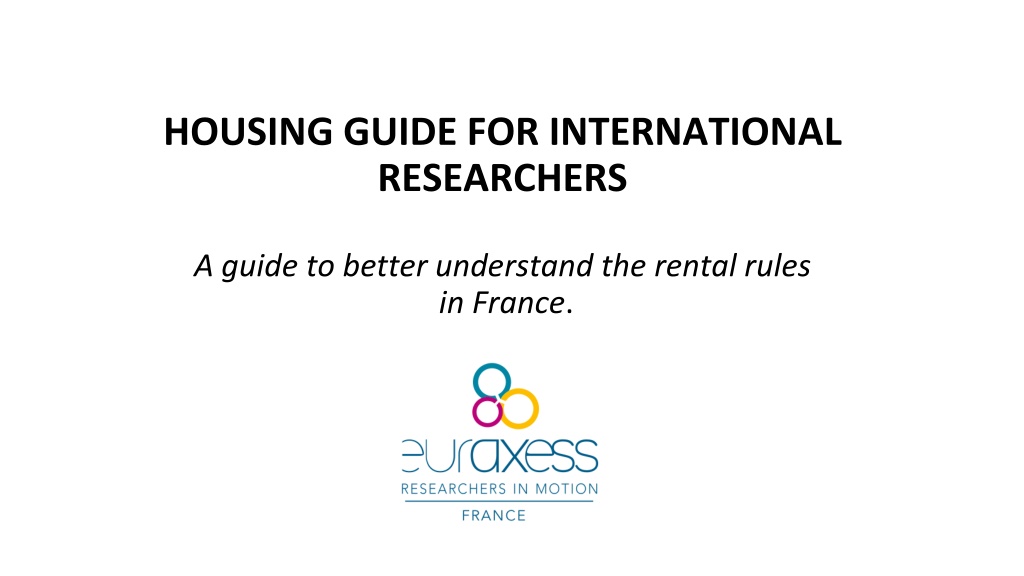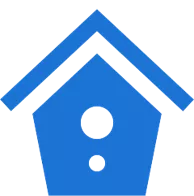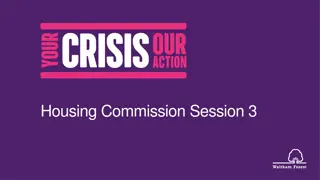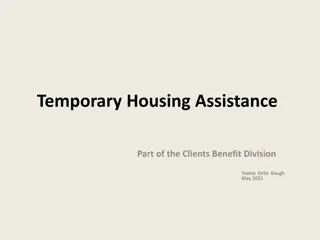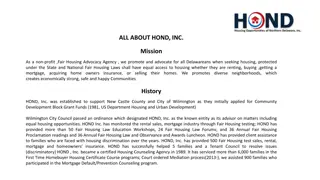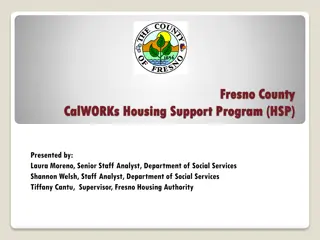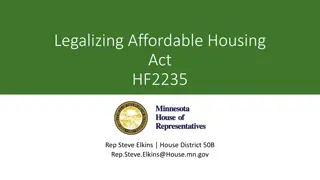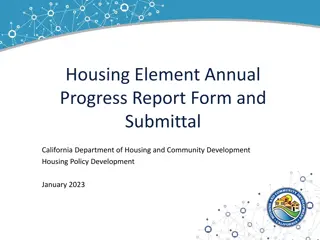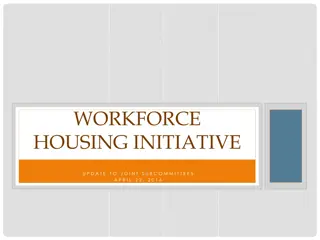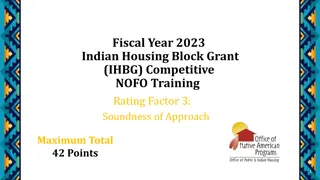Housing Guide for International Researchers in France
Understanding rental rules in France is crucial for international researchers. This guide covers defining search criteria, finding accommodation, signing a lease, moving in, and useful links. It also highlights criteria like length of stay, furnished or unfurnished options, and location preferences to make the housing search easier. Contact local EURAXESS centers for personalized assistance.
Download Presentation

Please find below an Image/Link to download the presentation.
The content on the website is provided AS IS for your information and personal use only. It may not be sold, licensed, or shared on other websites without obtaining consent from the author.If you encounter any issues during the download, it is possible that the publisher has removed the file from their server.
You are allowed to download the files provided on this website for personal or commercial use, subject to the condition that they are used lawfully. All files are the property of their respective owners.
The content on the website is provided AS IS for your information and personal use only. It may not be sold, licensed, or shared on other websites without obtaining consent from the author.
E N D
Presentation Transcript
HOUSING GUIDE FOR INTERNATIONAL RESEARCHERS A guide to better understand the rental rules in France.
Finding accommodation 1. DEFINE YOUR SEARCH CRITERIA Finding accommodation in France is an important and complex step. To deal with this, it is important to understand the French system and to know where to find answers to your questions. 1. DEFINE YOUR SEARCH CRITERIA 2. FIND AN ACCOMMODATION 2. FIND AN ACCOMMODATION This guide has been prepared by the EURAXESS France association to help you to organise your arrival and improve your stay in France. It is a reference tool, which will help you understand the specificities of access to housing in France and thus facilitate your efforts when looking for a place to stay. 3. SIGN A LEASE 3. SIGN A LEASE 4. MOVE IN 4. MOVE IN The French network of EURAXESS service centres is made up of more than 30 centres, personallised assistance to incoming researchers. Feel free to contact the EURAXESS centre close to your place of residence. providing daily and 5. LEAVE THE PREMISES 5. LEAVE THE PREMISES USEFUL LINKS USEFUL LINKS Please note: This housing guide may not replace or be deemed comparable to personalised advice provided by a legal professional. The EURAXESS France association reminds readers of the consequences that may result from a misinterpretation of the information published in this guide.
iconmonstr-home-5-240.png 1. DEFINE YOUR SEARCH CRITERIA = GO BACK TO THE HOME PAGE 1.1 Length of stay/family status 1.2 Furnished/ unfurnished 1.3 Location 1.4 Housing budget 1.1 1.2 1.4 1.3 Length of stay/family status Furnished/ unfurnished Housing budget Location Defining your criteria will make your housing search easier. 18-arrow.png 18-arrow.png = PREVIOUS PAGE = NEXT PAGE = = PREVIOUS PAGE NEXT PAGE
iconmonstr-home-5-240.png 1.1 Length of stay/Family status Depending on the length of your stay and your family status, we recommend you the most adapted solutions: Short-term stay Long-term stay Alone Couple/Family CROUS Residences Private student residences Room in a local s house House share Sublets (in accordance with legal conditions) Rental from a private owner Young workers residences Residences for researchers Tourism accommodation (max 90 days) Hotels & hotel apartments Youth hostels Rental offers may vary by city. Contact your local EURAXESS centre for more information. 18-arrow.png 18-arrow.png
iconmonstr-home-5-240.png 1.2 Furnished or unfurnished accommodation Furniture for a furnished accommodation must comprise the following items at least: - Bedding shall include a duvet or a blanket; - Curtains or window shutters in rooms intended to be used as a bedroom; - Hotplates; - Oven or microwave oven; - Fridge and freezer or, as a minimum, a frigde with a freezer compartment (-6 C); - Dishes necessary for meals; - Kitchen utensils; - Table and chairs; - Storage shelves; - Lighting units; - Housekeeping equipment adapted to the accommodation's features. An unfurnished (or empty) accommodation may include a fitted kitchen (with kitchen items and some appliances) but will not include furniture (table/chairs...) nor cooking utensils. Minimum surface area, regardless of type of accommodation = - 9 m for 1 person - 16 m for two persons, - + 9 m per additional person. All landlords are obliged to provide decent accommodation (meeting minimum surface area and comfort criteria). 18-arrow.png 18-arrow.png
iconmonstr-home-5-240.png 1.2 Contract duration for furnished or unfurnished accommodation Furnished accommodation (in main residence *) Unfurnished accommodation 1 year, automatically renewable or 9 months if the tenant has student status 3 years, automatically renewable Lease duration 2 months rent (excluding charges) maximum 1 month rent (excluding charges) maximum Security deposit At least 6 months prior notice before the end of the lease Prior notice required to terminate the lease from owner At least 3 months prior notice before the end of the lease 1 to 3 months prior notice before departure (depending on conditions) Prior notice required to terminate the lease from tenant At least 1 month prior notice before the departure If you come for a shorter stay, other short-term rental solutions exist (short-term agreement (specific dates), temporary residence, tourist accommodation...). Contractual terms & conditions may differ from the above. 18-arrow.png 18-arrow.png
iconmonstr-home-5-240.png 1.3 Location The location of your home is an important criterion and requires answering few questions related to your lifestyle: Do I prefer to live close to my workplace? - Do I prefer to live in the city centre, do I prefer entertainment, sports and cultural facilities...? - Do I want to live near public transports, shops...? - Is the location of the housing important according to my favorite mode of travel (walking, cycling, car/carpooling...)? - Please note that the enrolment in a public school is carried out accordingly to your place of residence. Your children will be educated in one of the schools located in your district or neighbourhood. 18-arrow.png 18-arrow.png
iconmonstr-home-5-240.png 1.4 Housing budget Short-term and furnished housing are usually more expensive. More generally, landlords and real estate agencies require the tenant's income to be at least 3 times the rental amount. Budget for your housing according to your financial status: Security deposit: 1 to 2 months rent depending on the type of accommodation The 1st month s rent is to be paid upon arrival and then always at the beginning of the following month Home insurance Moving expenses Real estate agency fees (limited by law and location) Costs of setting up telephone line/internet Water, gas, and electricity subscription fees Budget for monthly charges depending on the situation: rental costs, electricity, gas, costs for maintenance of the premises... Think about asking the landlord about the usual amount of these costs. Annual taxes (if applicable): housing taxes, household waste tax, television license tax Housing benefits: Depending on your individual status (family status, income...), you may be eligible for housing benefits from CAF (Family Allowance Fund). 18-arrow.png 18-arrow.png
iconmonstr-home-5-240.png 2. FIND AN ACCOMODATION How to find housing offers? Contact your EURAXESS Service Centre who will be able to assist you with your search (suggests appropriate solutions, facilitates the contact with landlords or residences...) Consult specialised housing websites Visit real estate agencies Search on the websites of local Tourist Offices Look for local adverts (newspapers, shops, billboards in universities...) Feel free to talk about your housing search to your colleagues and to your host institution. 18-arrow.png 18-arrow.png
iconmonstr-home-5-240.png When looking for an accommodation the terms or shortcuts used can sometimes make the adverts difficult to understand. Here is a non-exhaustive list of vocabulary to help you: French English explanation French English explanation cuisine am ricaine open-plan kitchen T1, T2, F1, F2 etc. pi ce (p) 2, 3 or 4 rooms (+ kitchen and bathroom) Room cuisine quipp e equipped kitchen arrondissement (arr) district/borough cuisine am nag e fitted kitchen ascenseur (asc) lift/elevator dep tde garantie rental deposit/deposit assurance habitation home insurance/housing insurance tage (et.) floor (level of a building) balcon (blc) balcony frais d agence inclus (FAI) inclusive of agency fees belles prestations attractive/quality fittings/fixtures garage (gge)/box garage caution/d p t de garantie damage deposit (rental property)/securitydeposit hauteur sous plafond (HSP) ceiling height chambre(ch, chbr) bedroom immeuble(imm) building or residence charges comprises (cc) including building charges (collective amenities)/outgoings appartement meubl furnished flat chauffagecollectif (shared) heating included in building charges rez-de-chaus e(RDC) ground floor/lobby copropri t shared property (apartments) digicode (dig.) digital keypad door entry system salle de bain (sdb) bathroom disponible (disp.) available salle d eau (s.d'eau) bathroom with shower colocation/colocataire (coloc.) shared rental / roommate / flatmate surface habitable (SH) total living space (a legal term definable habitable space, which excludes floor areas where the ceiling is below a certain height) escalier (esc.) stairs tr s bon tat (TBE) in good repair 18-arrow.png 18-arrow.png
iconmonstr-home-5-240.png 3. SIGN THE LEASE (RENTING CONTRACT) 3.5 Condition inventory report 3.3 Responsibilities of the tenant 3.1 Preparation of the file 3.4 Responsibilities of the landlord 3.2 The lease 3.3 3.1 3.5 3.4 3.2 Responsibilities of the tenant Condition & inventory report Responsibilities of the landlord Preparation of the file The lease 18-arrow.png 18-arrow.png
iconmonstr-home-5-240.png 3.1 Preparation of the file The documents that may be requested when handing in your file (or when sending by email) are the following: Proof of identity (identity card or passport) Proof of residency (entry visa or residence permit) Proof of income: last pay slips, own funds, tax notice, employment contract or employer's certificate specifying the job and proposed remuneration, start date and duration of the contract, etc. Student card or current year's tuition certificate for students Third party (guarantor) security: a family member, friend or legal entity who undertakes to pay on your behalf in the event that you do not pay the rent or charges: they must provide at least the same supporting documents Get in touch with your EURAXESS Service Centre for personallised advice. 18-arrow.png 18-arrow.png
iconmonstr-home-5-240.png 3.2 The lease Once your file is accepted, you must sign your lease (renting contract) which must include: - name and the home address of the owner; - names of the tenant(s); - effective date and duration of the lease; - destination of the accommodation (principal or temporary residence); - living area of the dwelling in m ; - description of the accomodation (house or apartment, number of rooms) and its private and communal facilities; - information on rent and security deposit (amounts, dates and payment frequency); - information regarding agency fees and condition & inventory report, if necessary; What must be paid? - The first month s rent - Security deposit - Agency fees (if applicable) Purchase home insurance that will protect your home and property against any losses that may arise. Both the landlord (or agency) and yourself will keep an identical copy of all signed documents. 18-arrow.png 18-arrow.png
iconmonstr-home-5-240.png 3.3 Responsibilities of the tenant Pay rent and charges on the scheduled dates, Use the premises only for the use set up in the rental agreement by complying with the rules of peaceful occupation, Perform any rental repairs if you are required to do so, Provide routine maintenance for the premises and its equipment, Take out home insurance, Pay the property tax (if the tenant is living in the building on the 1st of Januar and if the building is liable for property tax), Allow the owner access to the accomodation, according to agreed conditions and by appointment (work, visits by future tenants...). 18-arrow.png 18-arrow.png
iconmonstr-home-5-240.png 3.4 Responsibilities of the landlord Provide proper housing that is appropriate for residential use, Offer the housing in an appropriate condition, Freely provide a rental receipt upon request, Make any rental repairs required. 18-arrow.png 18-arrow.png
iconmonstr-home-5-240.png 3.5 Condition & Inventory report A condition report is a mandatory document that describes the rented accommodation. It is attached to the lease agreement. It allows the condition of the dwelling at the beginning to be compared with its condition at the end of the rental and to determine, in the event that repairs are necessary, those which are incumbent on the owner and/or the tenant. If the unit is furnished, an inventory must be attached to the condition report. It specifies the equipment and furniture provided with the accommodation and their condition. Check the proper functioning of equipment (appliances, smoke detectors...) Take a reading from the water, electricity and gas meters In the event of renting through an agency or with a professional: preparing the condition report at the start of the lease incurs costs. The cost, calculated according to the surface area of the accommodation, is shared equally between the owner and the tenant. The condition report upon exiting the premises is free. As a tenant, you have the right of rectification of the condition & inventory report made at the moment of signature of the lease (within 10 days after your arrival). Corrections must be sent by registered mail with an acknowledgement of receipt. 18-arrow.png 18-arrow.png
iconmonstr-home-5-240.png 4. MOVE IN 4.1 Change your address 4.2 Sign up for electricity, water, gas 4.3 Subscribe an internet/telephone line 4.3 4.2 4.1 Subscribe an internet/telep hone line Sign up for electricity, water, gas Change your address 18-arrow.png 18-arrow.png
iconmonstr-home-5-240.png 4.1 Change your address If it is relevant for you, think of informing companies/organisations and your close contacts of your new address (bank, insurance, employer, family, Prefecture...) Put your name on the mailbox and the doorbell of your new home! 18-arrow.png 18-arrow.png
iconmonstr-home-5-240.png 4.2 Sign up for an electricity, water and gas contract Upon completing the entry condition & inventory report, remember to read the meters. As soon as you move in, you must sign up for for electricity, gas and water contracts on your behalf (depending on the type of accommodation and the city). Check with your landlord to find out if the meters have been turned off before your arrival and ask about who the previous energy suppliers were. Some owners can offer an "all inclusive" rental so you don t need to go through these steps. 18-arrow.png 18-arrow.png
iconmonstr-home-5-240.png 4.3 Sign up for an internet/telephone provider Write down the the previous occupant s landline number (and name). Feel free to ask for advice and compare offers from different internet providers. There are websites that offer a comparison of available subscriptions for your accommodation (type of connection, internet speed, price, coupled mobile package deals...). Be careful, some contracts require you to sign up for a minimum duration! Once you have moved in, a French tradition is to have a cr maill re (a house-warming party ). This marks the happy end of your move when you can invite your friends to have dinner in your new place! 18-arrow.png 18-arrow.png
iconmonstr-home-5-240.png 5. LEAVE THE PREMISES 5.1 Send prior notice of departure 5.2 Condition inventory report upon departure 5.3 Refund of the security deposit 5.4 Before you leave 5.5 In case of a dispute 5.2 5.1 5.3 Condition & inventory report upon departure 5.4 5.5 Send prior notice of departure Refund of the security deposit Before you leave In case of a dispute 18-arrow.png 18-arrow.png
iconmonstr-home-5-240.png 5.1 The notice of departure You are allowed to cancel the lease at any time, provided that you comply with the conditions related to the prior notice (see 1.2/Schedule of contract periods) and pay the rent during the notice period. The request for termination of the lease must be made by way of a registered letter with an acknowledgment of receipt. Remember to make an appointment with the owner or agency to set the date and time to carry out the condition report upon exiting the premises. It is important to note the security deposit can under no circumtances be used to pay the last months ofrent. 18-arrow.png 18-arrow.png
iconmonstr-home-5-240.png 5.2 Condition & inventory report upon departure The condition & inventory report is completed together with the owner or a professional on the date of your departure from the premises in order to record any damage. The premises must be indeed left clean and without any damage. This report allows to compare the condition of the premises at the start of the lease with the condition at the lease term, and if there are any repairs required, it decides whether the owner and/or the tenant is responsible for such repairs. The condition & inventory report must be signed by both the owner and the tenant. Each of them shall keep an identical copy. You must return the keys and leave the premises upon completing the condition & inventory report. 18-arrow.png 18-arrow.png
iconmonstr-home-5-240.png 5.3 Refund of the security deposit If the landlord requires you to pay any repair costs, these must be justified by an estimation from a professional or an invoices. Some sorts of damage may be attributable to you (holes in the walls, damage, lack of maintenance...) but in no case shall the tenant be responsible for ordinary wear and tear of the furniture and equipment. If the condition & inventory report is in conformity with the entry one, the payback period of the security deposit is reduced to 1 month. Otherwise, it must be paid back to you within 2 months after leaving the premises. If necessary, remember to keep your French bank account open during this period so that the amount can be transferred back to you. 18-arrow.png 18-arrow.png
iconmonstr-home-5-240.png 5.4 To-do before you leave Communicate your new address to your landlord or your agency when you leave the premises Consider forwarding your personal mail to your new address Cancel your different subscriptions (electricity, gas, internet, telephone) and your home insurance Send a notification to your tax office about your new address For non-European Union citizens: if you move to another city in France, you must inform the Prefecture of your new location Contact your EURAXESS Service Centre few weeks prior to your departure if you need guidance with your departure procedures. 18-arrow.png 18-arrow.png
iconmonstr-home-5-240.png 5.5 In the case of a dispute For any advice, you can contact the ANIL (National Agency for Housing Information) or contact an ADIL (Departmental Agency for Housing Information) advisor in your region. Your EURAXESS Service Centre can give you advice on aid and assistance agencies in your city (legal aid associations, mediator...). 18-arrow.png 18-arrow.png
iconmonstr-home-5-240.png USEFUL LINKS List of EURAXESS centres in France: http://www.euraxess.fr/information/centres/search/country/france-1104 National Agency for Housing Information (ANIL): https://www.anil.org/ Departmental Agency for Housing Information (ADIL): https://www.anil.org/lanil-et-les- adil/votre-adil/ Ministry of Urban Planning: http://www.cohesion-territoires.gouv.fr/logement-et- hebergement Public Service Site - Housing: https://www.service-public.fr/particuliers/vosdroits/N19808 CAF: https://www.caf.fr/ Comparative website of energy suppliers (electricity and gas): http://www.energie-info.fr/ or https://calculettes.energie-info.fr/pratique/liste-des-fournisseurs Definition of a decent accommodation: https://www.service- public.fr/particuliers/vosdroits/F2042 Document produced by the "Housing" working group of the EURAXESS France association. Last update: June 2018 18-arrow.png
